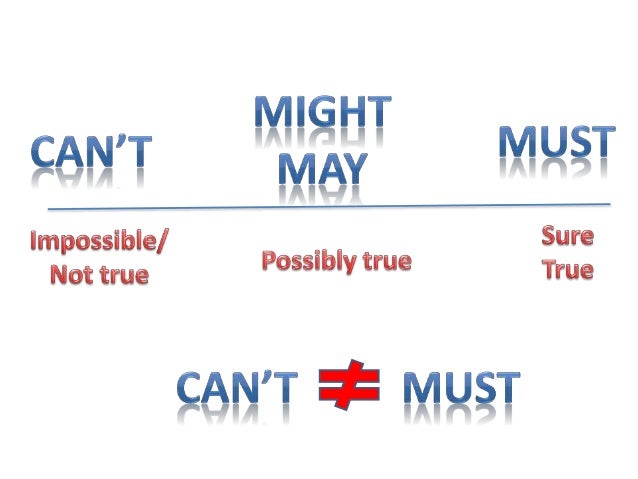MODALS OF DEDUCTION
"MODALS OF DEDUCTION: MUST, CAN´T, MIGT/MAY/COULD"
 Usamos verbos modales en una situación en la que necesitamos cierto nivel de deducción, lo que significa que decimos cuán seguros estamos acerca de algo.
Usamos verbos modales en una situación en la que necesitamos cierto nivel de deducción, lo que significa que decimos cuán seguros estamos acerca de algo.
1.- MUST
Usamos must cuando estamos seguros de que algo es cierto porque hay pruebas muy sólidas.
Ejemplos:
- He must live near here because he comes to work on foot. We don’t know where he lives but we’re sure it’s not far away.
- Come inside and get warm – you must be freezing out there.
- You’re a zookeeper? That must be very interesting.
(Must+infinitive without 'to')
2.- CAN´T
Usamos no podemos cuando estamos seguros de que algo no es verdad.
Ejemplos:

- It can’t be a burglar. All the doors and windows are locked. He doesn’t know it’s not a burglar but he feels sure it’s not.
- It can’t be far away now. We’ve been driving for hours. Where’s the map?
- Really? He has to work on Christmas Day? He can’t feel very happy about that.
(can't+infinitive without 'to')
3 MIGHT, MAY, COULD
Utilizamos might, may o might para decir que creemos que algo es posible pero no estamos seguros.
Ejemplos:
- Did you hear that? I think there might be a burglar downstairs. She’s not sure there’s a burglar but she thinks it’s possible.
- We’ll try to get there early but we may arrive late if there’s a lot of traffic.
- Don’t put it up there. It could fall off and hit someone.
Might, may and could también son seguidos por un infinitivo sin 'to'.


Comentarios
Publicar un comentario